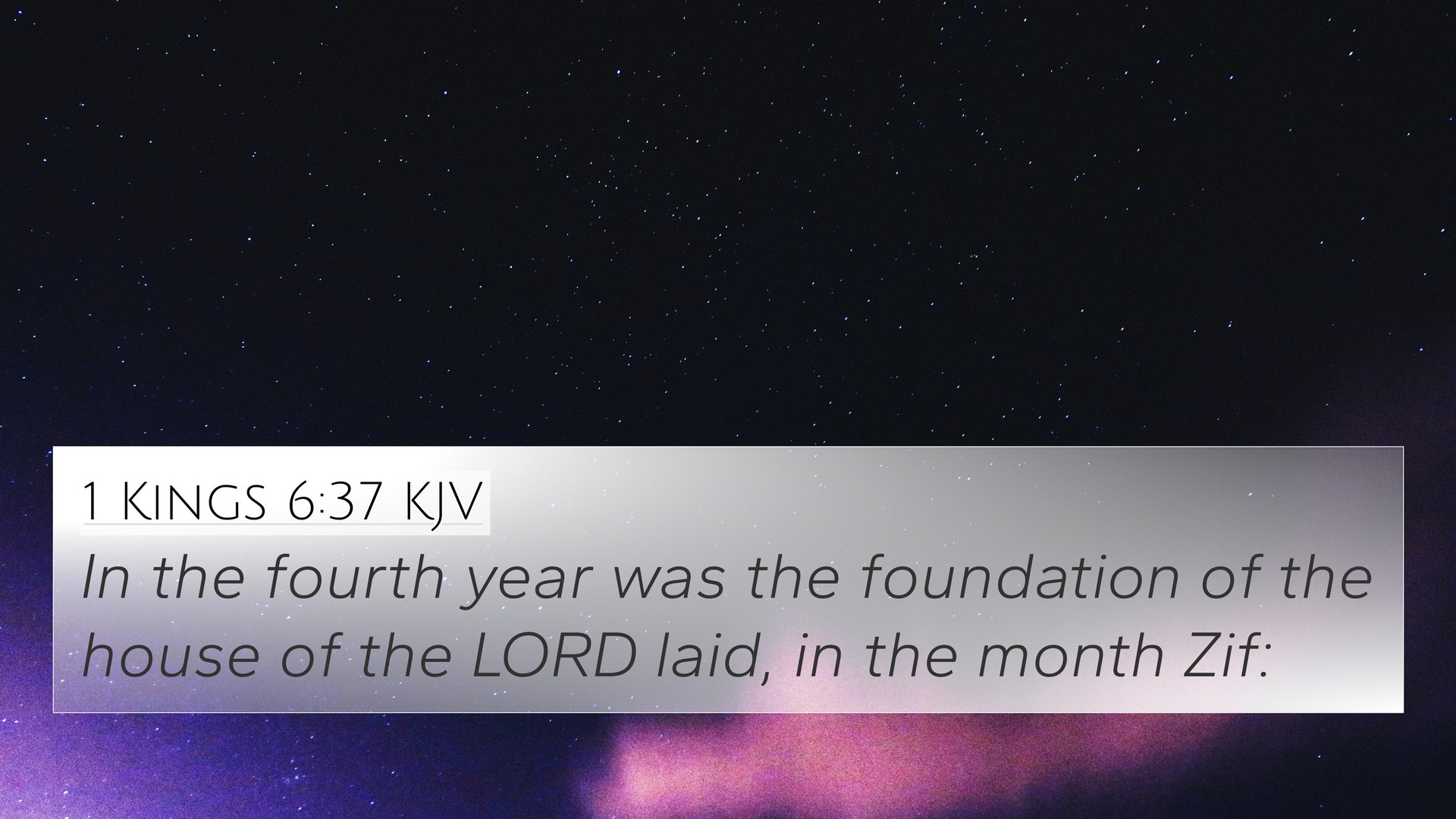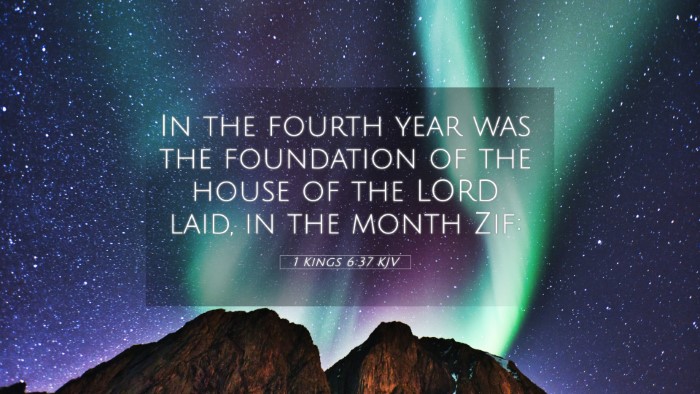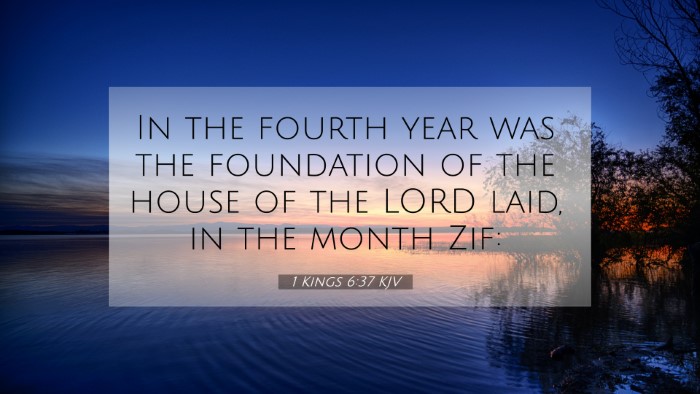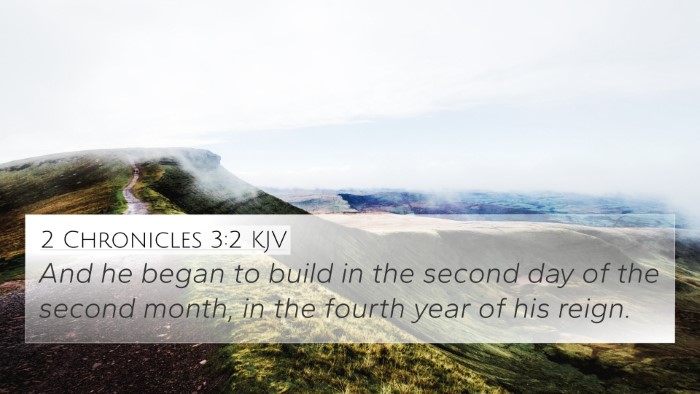1 Kings 6:37 Meaning and Interpretation
In 1 Kings 6:37, the construction of Solomon's temple is highlighted, with emphasis on the grand design and meticulous craftsmanship that went into its erection. This verse reads:
"In the fourth year was the foundation of the house of the Lord laid, in the month Zif."
The verse symbolizes not only the physical beginning of one of the most significant structures in biblical history but also represents the spiritual foundation of Israel as God's chosen people.
Commentary Insights
Matthew Henry's Commentary
Matthew Henry emphasizes the significance of the timing of the foundation's laying, noting that it reflects God’s providential dealings with His people. The act of founding the temple in the month Zif indicates divine favor. It may indicate the unfolding of God's plan through Solomon, reinforcing the importance of establishing a place of worship that reflects God's presence among His people.
Albert Barnes' Notes
Albert Barnes points out the precision of the construction described in the context of 1 Kings 6:37. He notes how the foundation signifies stability and permanence in worship. Solomon's temple serves not only as a physical structure but as a lasting spiritual symbol for generations to come. Barnes also reflects on the importance of the quality of materials and labor, signifying that worship demands the best offerings as service to God.
Adam Clarke's Commentary
Adam Clarke elaborates on the symbolism of Zif, which can be associated with brightness and clarity. According to Clarke, this places the foundation of the temple in a context that emphasizes the glory of God. The laying of the foundation is seen not merely as a construction project but as a new beginning for God’s chosen people—a place where they can encounter God.
Bible Verse Cross-References
- Exodus 25:8 - God's instructions for building the tabernacle highlight the importance of having a sanctuary for divine presence.
- 2 Chronicles 3:1 - Reiterates Solomon’s choice of location for the temple, emphasizing its significant foundation.
- Psalms 132:13-14 - Discusses God's choice of Zion as His dwelling place, connecting to the theme of the temple as a place of communion.
- Hebrews 9:11-12 - Illustrates the greater sanctuary that Christ represents, drawing a parallel between the old covenant and the new.
- Matthew 21:12 - Jesus’ cleansing of the temple emphasizes the temple's importance in worship and its sanctity.
- Acts 7:47-50 - Stephen recalls the temple’s history as a dwelling place for God, connecting past with present understanding.
- Revelation 21:22 - Refers to the ultimate dwelling place of God with humanity, transcending the physical temple.
Connections Between Bible Verses
The connections between various Bible verses surrounding the building of the temple reveal deep thematic consistencies in worship, divine presence, and the historical faith journey of God’s people. This is vital for understanding inter-Biblical dialogues and the overarching narrative of redemption.
Cross-referencing scripture can illuminate parallel teachings, such as the transition from the physical temple to the spiritual body of Christ. The temple built by Solomon stands as a crucial piece of God’s redemptive history—a theme echoed throughout biblical texts.
Practical Applications
Understanding 1 Kings 6:37 in light of its commentaries and cross-references can deepen one's appreciation of biblical themes such as God’s faithfulness and the necessity for dedicated worship. It can serve as a reminder to lay a strong foundation in one’s own spiritual life, paralleling the dedication seen in Solomon's efforts to build God's temple.
Cross-Referencing Biblical Texts
To effectively engage in a cross-reference Bible study, tools such as a Bible concordance or a cross-reference guide can enhance comprehension of verses. Identifying connections between Old and New Testament writings can reveal the continuity of God’s message and His enduring purpose for humanity.
Conclusion
The significance of 1 Kings 6:37 extends beyond its literal meaning, encapsulating a deeper understanding of God’s dwelling among His people and the importance of worship. Through comparative Bible verse analysis and thematic connections, believers can appreciate the richness of scripture and its relevance today.




